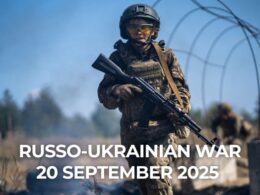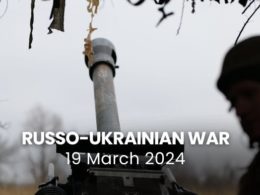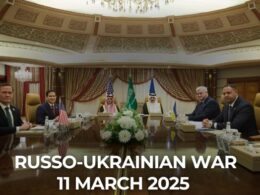Quick fire
- Russian-led occupation forces launch 5 attacks on Ukrainian positions in Donetsk, Luhansk, and Mariupol sectors, including heavy artillery and weapons banned by Minsk. 1 Ukrainian soldier killed, 1 wounded
- Russian proxies twice denied OSCE SMM passage at Zolote & Molodizhne; once delayed passage at Stanytsia Luhanska, Luhansk Obl.
- US urges the EU to join economic sanctions against Russian and Russian banks, in particular, should Russia invade Ukraine further
- Ukraine’s prime-minister Denys Shmyhal says the first 50 kilometers of border with Belarus already strengthened with necessary infrastructure and fences, according to the emergency plan. Intensive work continues
- White House press secretary Jennifer Psaki states that without European counterparts there can be no talks with Russian on European security
Russian ultimatum, Ukraine’s & NATO response
Russia has published a wish list of security conditions which Russian deputy foreign minister Sergei Riabkov says is “not an ultimatum” but includes unenforceable demands in effect returning NATO forces to their position in 1997. In particular, the US and other NATO member prior to 1997 should not deploy their troops in the Baltics, Poland, and other states which entered NATO later. Kremlin also demands NATO forces not participate in any activity in Ukraine.
"It is the reversal of the escalation and the ending of Russia's international armed conflict that is the best guarantee of security on the continent," Ukraine’s Foreign Ministry spokesman Oleh Nikolenko said. He added that Ukraine and its NATO partners independently define their relationships, including in military cooperation, as sovereign entities. He listed things Russia should do for de-escalation:
"We urge Russia... to return immediately and unconditionally to the constructive agenda and to start implementing the Minsk Agreements and the Normandy Leaders' Agreements now, in particular the agreed conclusions of the 2019 Normandy Quarter summit. It is first of all strict adherence to the ceasefire, further draw away of forces, continuation of the demining process, implementation of the political aspects of the Agreed Conclusions of the Paris Summit, opening and ensuring the proper functioning of new checkpoints on the contact line, holding the next stages of mutual release of POWs and exchange of their lists.”
Upon receiving the statement on “security guarantees,” NATO Secretary-General Jens Stoltenberg said at a briefing that NATO is considering a dialogue with Russia on this issue, but any dialogue should include the Alliance’s concerns and Ukraine’s position.
“We are clear that any dialogue with Russia must take into account NATO’s concerns about Russia’s actions, be based on key principles and documents on European security, and take place in consultation with NATO’s European partners such as Ukraine... “We reaffirm our support for Ukraine’s territorial integrity and sovereignty. NATO’s relations with Ukraine are a matter only for Ukraine and 30 NATO allies,”Stoltenberg said.
Every third Ukrainian, 58% of men ready to resist with arms in hand if Russia invades their town
That is according to the survey of the Kyiv international institute of sociology conducted on 3-11 December 2021. The readiest to fight are respondents at the age between 40-49.
While 33.3% are ready to fight with arms in hand, 21.7% are ready to resist by participating in civil resistance actions. In general, 50.2% of Ukrainians are ready to resist in one way or another. Among other options - 14.8% would go to a safer region, 9.3% would go abroad, 18.6% would do nothing. Another 12.1% did not answer, and 1.1% refused to answer the question.
In the regional dimension, the willingness to resist varies from 60.5% in the West to 37.2% in the East. Willingness to offer armed resistance - from 39.7% in the West to 25.6% in the East.
New strengthened UN Crimean resolution calls on states to join Crimea Platform, names Crimean Tatars an indigenous people
On December 16, the UN General Assembly (UNGA) adopted an updated resolution “Situation of human rights in the temporarily occupied Autonomous Republic of Crimea and the city of Sevastopol, Ukraine.” This is UNGA’s sixth resolution on human rights in Russian-occupied Crimea adopted by the Assembly every year since 2016. Compared to last years' one, this resolution calls on UN member countries to cooperate in Ukraine's newly-launched Crimean Platform, calls the Crimean Tatars an indigenous people, names more Ukrainian political prisoners of the Kremlin, places responsibility on Russia for providing Crimeans with drinking water, and more.
Ukraine’s security service (SBU) says a critical shortage of coal, Prime Minister denies
As of 1 December 2021, 486,200 tons of coal were in storage, while the accumulation plan is 2,632,000 tons – more than five times more than the actual reserves, SBU warned on 8 December.
As we have reported before, Ukraine’s storage of coal became critically low after Russia halted coal imports to Ukraine in November. Deficit of gas deepened the troubles. At the end of November, the government said no need for panic for additional shipments of coal will soon be arranged.
Triple disconnection: how Russia seeks to destabilize Ukraine’s gas, electricity, and coal markets
Today Ukraine’s Prime minister emphasized that Ukraine has enough coal and gas to pass the heating season without troubles and “the problem is solved.” Some of the experts don’t share these views, though, claiming the critical deficit may occur in February due to the low pressure of gas in the system.
MPs uphold mandatory cash registers for small businesses from 1 January
There were not enough votes to postpone the introduction of mandatory cash registers for small entrepreneurs during today's voting in the Parliament. Therefore mandatory cash registers will be introduced from 1 January 2022 in Ukraine.
Entrepreneurs were protesting this measure earlier, saying it will hamper the business activity of the small and especially micro businesses. At the same time, the government claims mandatory cash registers should prevent tax evasion.
Analysis worth noting
In this last part of our series "30 years of Freedom", you can read about the current situation in Transnistria, the view from the Baltics on why the EU and NATO are so hesitant about accepting Ukraine as a member, and about the possible solution to Russian offensives against Ukraine, Moldova, and Georgia. Ten speakers from 6 countries shared their views on security issues.
This is the last of the four-part series, 30 Years of Freedom. The series is based on the comments of our speakers, including extracts from their published essays:
- Part One. Demolishing monuments not enough to destroy post-Soviet nostalgia, but property rights help | 30 Years of Freedom, p.1
- Part Two. The post-Soviet oligarchies and how they shaped national state politics | 30 Years of Freedom, p.2
- Part Three. The end of the Soviet Man: How ex-USSR states forged their national identities | 30 Years of Freedom, p.3
- Part Four. How to stop Russia’s wars in post-Soviet states? | 30 Years of Freedom, p.4
How to stop Russian aggression in post-Soviet states? | 30 Years of Freedom, p.4
Other news
A Sun team was granted access to a crack Ukrainian unit dug into WWI-style trenches closest to Vladimir Putin's 175,000-strong force and shared their exclusive photos and comments of Ukrainian soldiers who vowed to fight to “their last breath and bullet.” Their reportage is here.
A Twitter storm in support of Ukraine was held today. In #UkraineWillResist people told why and how they are ready to defend Ukraine in the case of Russian further invasion.
Meet Mariana Zhahlo, a physics teacher & mom by weekday, territorial defense soldier by weekend. This badass woman is why #UkraineWillResist #УкраїнаЧинитимеОпір until it is fully free from Russiahttps://t.co/u9VIGKYeHp
Join the Twitter storm today& tell why #UkraineWillResist pic.twitter.com/D5OzmqCqJp
— Euromaidan Press (@EuromaidanPress) December 17, 2021





